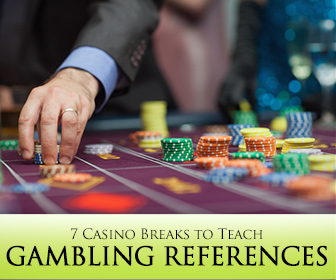How to Teach Using Games


If you teach conversation classes or advanced English learners that want to understand colloquialisms to improve their fluency, or if you want to energize your intermediate or even beginner classes with interactive games, try one of these quick gambling casino breaks that also educate!

This phrase refers to placing a starting bet to enter a round of poker or other gambling card game. Bring poker chips (or a handful of coins) to class. Have an empty box or can ready. Also bring quick prizes, like candies. Prepare to ask a lot of questions that day that quiz prior teaching or follow-up on that day’s learning objectives. Give a set amount of chips to each student at the beginning of class, like 5 chips. Explain that you will ask questions throughout class, and, if they think they know the answer, they can “ante up” to get in the game by placing a chip in the can. Then, if they are in, ask them to write down the correct answer. If they answer correctly, give them a candy.
Americans use this phrase quite frequently, and it is a reference to placing a wager on a particular horse before a horse race. It can be applied to wagering on any competitive event before it happens. Try a “Place Your Bets” grammar game. Again, you can use your poker chips. Give students a set number, and separate them into two groups. For a grammar principle you are teaching, like relative clauses, create a list of words that can make a properly constructed sentence. Only give the topic, relative clauses, and have the four first contenders come to the board with a marker. Tell students in the audience that they can bet any number of chips on any combination of players, depending on who they think will form a correct sentence first from the given words. Say, “Place your bets!” and have them set their bets on their left hand side for group one or right hand side for group two. Double their chips if they win, or take them away if they lose!
An underdog refers to any team or player in a sporting situation that is considered inferior to her opponent and most likely to lose. Americans love cheering for underdogs and use this term often in other non-sport arenas as well, so it is helpful to understand. Play on the phraseology by creating a game where students have to pick between two words to complete “under” sentences to practice vocabulary or other concepts. For example, ask them to choose which word best completes the sentence “We walked under the _____” and provide two words such as, “sky” and “ceiling”. You can actually make these quite tricky!
This refers to wagering all of your remaining gambling money because you think you are going to win. Americans use it in situations to express that they are putting their confidence and/or resources and support into something or some situation. Make a game where students have to rate their confidence level for an answer, like “not sure”, “probably”, or “all in”. Give them more points for going all in and getting the answer right!
This comes from Black Jack when the player gambles on taking another card to improve his chance of reaching 21 without going over. Create a quick game where students line up, and, one by one you show a picture flashcard of a vocabulary word, or a number, or whatever else you are practicing. The player keeps the card if she gets the answer right and can choose “hit me” or “stick”. She loses all the cards won during her turn if she “goes over”, or gets one wrong. The player with the most cards wins.
This applies to chance games where one wins solely on being lucky and getting the winning number or card. Make participation cards of any sort depending on what you are teaching that day like conversation questions, vocabulary words, etc. Mark one with a star or other symbol. Ask students to draw a card at any break point in your class, and exercise your chosen activity. Then, ask students who has the star, and explain that she wins by luck of the draw and give her a prize. This is a good game to repeat every few classes with different concepts so that they anticipate the star!
Give each student a card with a principle that you are going to teach that day, whether it is vocabulary words or grammar. If they do have long sleeves, ask them to look at the word or principle and put the card up their sleeve to take out when the topic comes up in class. For example, if you are teaching question words that day, like who, when, where, and why, give cards to students with “what” on one side and a question on the other side. After you explain “what”, you can ask, “Who has what up their sleeves?” The students with “what” cards can read their questions for the class to answer.